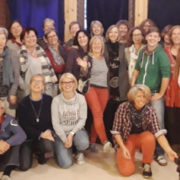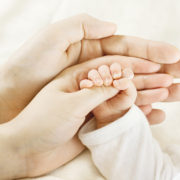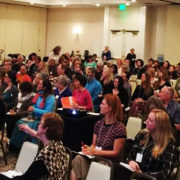Therapeutic Play with Babies and Children: Transforming Difficult Prenatal and Birth Experiences Together
In 1990, I opened my psychotherapy practice to families with young children who were having difficulties in their lives. Even though their symptoms and behaviors covered a wide range, they all had something in common – something had not gone well during their prenatal, birth, or newborn experience, and the child and family had never really gotten over it. I began specializing in therapeutic child center family play therapy as a way to work with those very early experiences.
The children taught me a great deal over the years. If we slowed down and allowed the child to lead us in the play, they would reveal their accurate memories and reactions to what had happened while they were in the womb or as a newborn. And with intentional play, we could elegantly help them heal and the whole family experienced more closeness and positive feelings together.
In 2002, I wrote a JOPPPAH article, The Power of Beliefs: What Babies are Teaching Us. In it I discuss how young babies already portray a sophisticated and established complex of beliefs and patterns of being in the world. I describe four clinical stories of babies in PPN-oriented BEBA therapy sessions who are expressing very difficult patterns based upon earlier experiences in the womb, during birth and as newborns.
Babies and children live in the inner world of their earliest experiences, from the womb, birth and newborn period, throughout their daily lives. Often the meaning and significance of their challenges, reactions, and ways of being in the world are not recognized as patterns established so early in life.
Prenatal and Perinatal Psychology (PPN) oriented therapies have developed ways to identify and help babies, children, and families heal difficult early experiences and transform them into more life-enhancing experiences of being in the world. PPN-oriented therapeutic play is an effective way to do this and can be done in the office with a PPN professional and also at home with parents perceiving and engaging their children with this purpose in mind.
I discovered the prenatal and perinatal psychology community when I attended an APPPAH Congress in 1989. I began PPN therapy training and opened my PPN-oriented family psychotherapy practice in 1990. I have been captivated by babies and children as they show me more and more of their sophisticated multidimensional world of early influences, being in the world and communication. Therapeutic play, play with intention, presence, compassion and sensitive mutuality, can be incredibly healing and transformative for the whole family, as well as for the professionals involved! Kids and babies have shown me things beyond my beliefs or understandings of what is possible. I always feel I am ‘catching up’ to their fuller capacities and what they are showing us that so often goes unrecognized or misinterpreted just because it lies outside our “set” of possibility.
Kids have portrayed so many of their stories in my presence during therapeutic play – A 3-year-old tells her NICU story with a Playmobile medical suite; a 4-year-old moving in and out of a folded futon, shows us what happened with his planned C-section and separation from his mother, a 4-year-old portrays a complex sequence of events with several symbols from my play therapy shelves of a stressful weekend when he was 5-month in utero, a 9-month-old baby crawls over to a doll and expresses his grief over the loss of his twin during the first weeks of pregnancy, and a toddler tells the story she’s holding onto of something that happened to her mother 20 years ago.
I now have retired from providing in-person PPN play therapy. In my private consultation practice, I continue to consult with families and mentor them to incorporate PPN-oriented play in their lives. Babies, kids, and families have taught me SO MUCH over the years. I want to give forward some of the gems I have learned to help you.
For more information about our upcoming PPN Therapeutic Play Webinar Series for Parents and Professionals (Grandparents, too!) March, 2018, click here. Discounted pricing for early registration.









